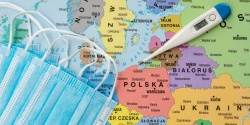Published: 20.12.2022

The WHO's Intergovernmental Negotiating Body is continuing work on a draft of the so-called "anti-pandemic treaty. The next draft replicates the document's previously stated goals, such as establishing a central role for WHO in coordinating health policy and coordinating scientific information. During discussions, the need to take into account so-called reproductive rights was emphasized. At the third INB meeting, member country delegations adopted the new draft, pointing out the need to define the term "pandemic." The INB office is working on preparing a "zero" draft based on additional information received from member states. The draft will be in circulation as of February 2023, and negotiations are scheduled to begin at the fourth INB meeting - February 27.
From December 5-7, 194 WHO member states met in Geneva for the third meeting of the Intergovernmental Negotiating Body (INB), established to draft a binding international agreement on the management of future health threats and pandemics. Before each meeting with member states, the INB delegation sends them a new draft based on what was achieved at the previous meeting.
The delegations discussed the content of the agreement on the basis of a draft previously prepared by the INB Office, which compiled comments submitted by member states and stakeholders at previous meetings and the results of public consultations, in which the Ordo Iuris Institute also participated.
Contrary to most of the positions expressed during the public consultations, the latest draft of the agreement reiterates the intention to centralize the coordination of future health emergencies in the hands of the WHO.
Among the agreement's main points, it emphasizes that policies and interventions for prevention, preparedness, response and recovery of health systems should be supported by the best available scientific evidence, and that global, regional and national policy decisions should be based on science and evidence. The draft recognizes the WHO as the most appropriate body "to generate scientific evidence."
During a discussion held recently in Geneva, countries welcomed the draft presented by the INB Bureau, stressing in particular the need for a common definition of a pandemic and ensuring the principle of transparency and equity as key points for future negotiations. Some delegations also explicitly stressed the need to include provisions protecting so-called reproductive health in the agreement. At the end of the three-day meeting, member states agreed to draft toward a legally binding agreement to be published in February 2023, in order to start negotiations at the fourth INB meeting, scheduled for Feb. 27
"In light of the new content published by the INB, it appears that the new agreement is increasingly moving toward global health coordination under the control of the WHO, where there is a risk that the actions of public authorities will be based solely on information provided by the WHO itself. Such an approach - although currently outlined only in general content - leaves room for serious questions on the grounds of freedom of expression and future ways and means of managing health crises. The risk of equating scientific information only with globally accredited information, in fact, threatens to transform medicine from a science based on free and fair scientific debate to one based on authority," commented Veronica Turetta, an analyst at the Ordo Iuris Institute's Center for International Law.

02.05.2025
· The Ordo Iuris Institute, the Hungarian Center for Fundamental Rights, and the Foundation of the Patriots for Europe group in the European Parliament organized a conference in W

09.04.2025
• On April 8, the Ordo Iuris Institute presented the Polish version of a document with proposals for reforming the European Union, prepared jointly with Hungary’s Mathias Corvinus Collegium (MCC).

08.04.2025
Sixth Court Hearing Ends Without Progress

07.04.2025
In response to the liberal left’s self-proclaimed “militant democracy” in Poland and